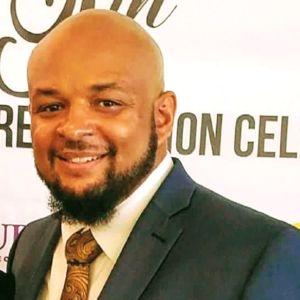
Dennis Henderson's Biography:
Dennis Henderson is a dynamic educator and advocate of social justice through education who has impacted the lives of youth and families for over 20 years. Throughout his career, Dennis is renowned for his grassroots approach to education and designing collaborative learning experiences with a variety of industry leaders to create programs that provide students and families exposure to educational, economic and personal growth opportunities within the region.
Mr. Henderson has designed and implemented a variety of programs focusing on entrepreneurship, law-related education, sustainability, STEM, and outdoor recreation. His work as an educator has been recognized nationally and internationally and for the past four years, he has served as a lead administrator at Manchester Academic Charter School (MACS) as the Deputy Chief Executive Officer.
Dennis served as an instrumental leader with the development and programming of the Museum Lab and led $4.2 million capital campaign for the establishment of MACS Middle School within the Museum Lab, which opened in 2019 as the largest cultural campus for youth in the nation. Collaborating with the Children’s Museum of Pittsburgh, Saturday Light Brigade and other youth-oriented organizations, the museum lab will serve as a national model highlighting Pittsburgh's collaborative commitment to public education, innovation and experiential learning.
In 2013, Mr. Henderson was involved in an unjust arrest in which his civil rights were violated. Within his settlement, Mr. Henderson worked with the ACLU to implement policies to help improve police community relations.
With the support of his wife, Monica, and his daughters, Denia and Jacey, along with his colleagues, friends and family, Dennis is blessed to incorporate his personal and professional experiences into career.
Future of Social Studies:
The future of social studies involves teaching the truth. The truth of our society: It doesn't matter how good you are at something. If you are African American, you've got to make sure that you are extremely good to get the due recognition that you deserve. Race and racism have always informed my teaching. Early on, I told my students: “If you study and follow my advice, the world will be open to you, though it won't always be fair”— as I was reminded on June 26, 2013. I had been at a public meeting in Pittsburgh about improving community-police relations. Tensions were high. Afterward, I stood in the street by my car, talking with a news photographer. A police cruiser sped by. I yelled, "Wow."
The car stopped, and a white officer asked if I had a problem. I requested the officer's badge number and hit record on my cellphone. The officer told me to put the phone down. When I didn't, the officer arrested me. I was charged with disorderly conduct, obstructing the road and resisting arrest. Images of me, handcuffed, hit the evening news, and were seen by my students. I fought the charges and the district attorney dropped all charges. The city found that the officer had acted improperly and disciplined him. I sued the city, and the city settled.
When I teach that lesson to my students, I underscore the need for every person to stand up for what is right. There is the future of social studies.
